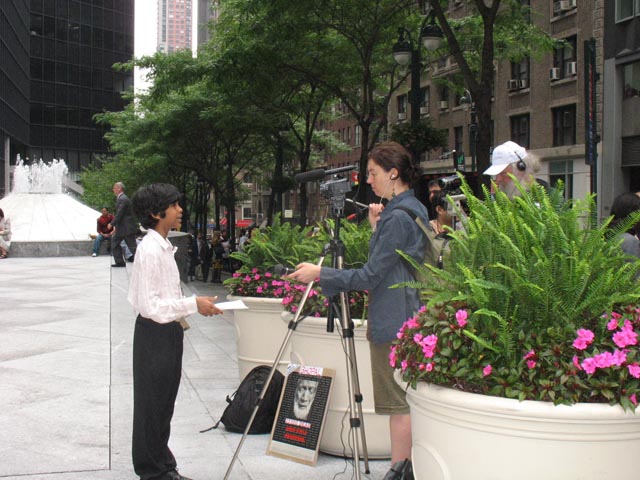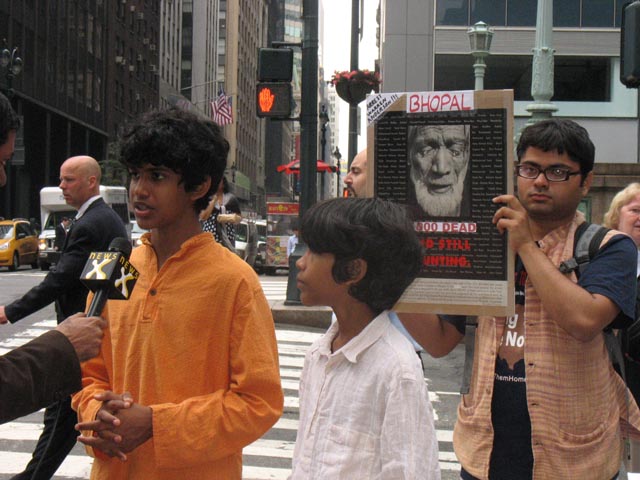The Bhopal Gas Tragedy – A Story with No Ending
Where is the Outrage? Bhopali activists soldier on.

What happens when an activist tries to reach the powers that be?
On June 14, 2010, members of the International Campaign for Justice in Bhopal and of Kids for a Better Future attempted to hand deliver copies of a warrant and criminal charges against Union Carbide Corporation and against its former CEO, Warren Anderson, to the office of their attorneys in Manhattan, in connection with a 25 year old criminal case against them for the 1984 Union Carbide gas disaster in Bhopal, India.
Not much happened but at least some awareness was created, especially in the media. Even mere symbolism is better than no protest, because without protest, it’s an easy road to indifference, and eventually to forgetting.
Here Akash Viswanath Mehta, 12-year-old founder of Kids for a Better Future, talks about the experience of protesting against a giant corporation.
1. What were your thoughts as you set off for the office?
I didn’t really know what to expect. I kept thinking about the fact that we were about to go ask an 89-year-old who was apparently haunted by the disaster to go behind bars, probably for the rest of his life. Because, while in my personal statement on behalf of KBF I appealed to his conscience, the over-all message of the event was delivering an arrest warrant. What I was really asking him was to do was to make a moral statement supporting the Bhopalis and acknowledging Dow and Carbide’s role in the disaster.
2. Did you manage to connect with anyone?
In our attempt to speak with and appeal to Anderson (or at least his lawyers) we hit the same corporate wall that Bhopal activists always have hit. No one came out to speak with us; the building security threw us off their property and refused even to deliver our letter to the law firm’s office. So I read KBF’s statement in front of the press that had gathered outside the building, and I hope that many people see this message and learn a little more about the continual injustice that Bhopal is faced with.

3. What’s next for this campaign? Do you find it discouraging or do you think you just have to persist?
Some would say that there is no hope for change in Bhopal. Bhopali activists have been campaigning for 25 years. Have we ever got Dow to clean up the site? Or compensate the victims? Or supply health-care to the survivors and the next generation? No. But that’s not to say our efforts have been in vain.
Supporters of Bhopal have accomplished so much. They’ve created a clinic called Sambhavna that gives free health-care to all victims of the disaster, which has saved thousands of lives. Through our efforts many areas of Bhopal now have access to clean water that didn’t before, including some of the poorest districts in Bhopal. And most importantly, we’ve raised awareness all across the world – we’ve done everything from opposing Dow’s propaganda machines and defeating their green-washing attempts to creating a international web of supporters of Bhopal. Bhopali activists have been doing this for 25 years, and have achieved so much – and we’ll keep on fighting, because without it, Bhopal would be forgotten, and then it would truly have no hope.
4. How do you collaborate with International Campaign for Justice in Bhopal?
Last year, KBF raised $12,000 for the Sambhavna Clinic in Bhopal, and our volunteer effort was in support of the ICJB. I feel that we should do everything that we can to support them, especially because as children, we are in a unique position to garner media attention for a cause that is, unfortunately, largely forgotten. The campaign needs support on its American front, and we’re here to do everything we can to put the spotlight on Dow Chemical and its crimes.
For more information:
International Campaign for Justice in Bhopal
www.kidsforabetterfuture.org
Related Post: Bhopal Verdict
An open letter to Warren Anderson from Akash Viswanath Mehta, age 12, of Kids for a Better Future.
Last Monday, Union Carbide and seven persons were held guilty for the Bhopal Gas Disaster by an Indian court. They were all given absurdly small sentences, and have all paid $2000 in bail, escaping punishments relating to the deaths of 25,000 innocent Bhopalis. Warren Anderson, former CEO of Union Carbide, was declared guilty, in absentia, for manslaughter in the year of the disaster, but he ignored the court summons, and instead was declared an absconder by the Indian Government. The Indian Prime Minister refuses to act, so Bhopali activists are here instead.
Twenty five years ago, Warren Anderson was the CEO of Union Carbide when the terrible disaster occurred. Now, I don’t want to depict Anderson as a despicable creature who killed thousands of people. In fact, I’d like for everyone to remember the fact that despite all legal counsel, purely because of a feeling of moral obligation, Anderson went to Bhopal after the disaster to survey the scene firsthand. I don’t doubt Mr. Anderson’s claims to a guilty conscience; any human being involved with the tragedy would feel terrible.
Twenty five years ago, Mr. Anderson escaped arrest and his day in court. I have no illusions that that day will come for Mr. Anderson, who is no longer the face of the Bhopal’s suffering anyway. But, I would like today to appeal to Warren Anderson’s conscience, his guilt and his grief, and ask him to stand beside me.
If he is truly haunted by the disaster that happened on his watch, which destroyed an entire community, I ask him to come forward and make a moral statement about what the right thing is for Dow and Union Carbide to do. According to American Law, the polluter must pay, and so Dow, the owner of Union Carbide, must pay to clean up its mess. Every single employee and former employee of Dow Chemical and Union Carbide has such tremendous power to make a difference for the people of Bhopal, especially Mr. Warren Anderson. There is still plenty of work to be done in Bhopal. 15 people still die every month due to the long-term effects of the disaster. Generations have been born with birth defects. Bhopal’s water is still poisoned.
If you really feel that guilt, Mr. Anderson, don’t just hide – speak out, reflect publicly about your regrets, announce to the world your sympathy for and support of the Bhopali people, and demand that Union Carbide and Dow Chemical clean up Bhopal, and adequately and fairly compensate all the victims’ families.
Mr. Warren Anderson, you have such power – use it to make the world a better place. Come join hands with us in our struggle to clean the site where thousands of people still live today. Mr. Warren Anderson, today you are known only for your role in the disaster, your name is met only with hatred by hundreds of thousands of Bhopalis, and people all over the world. The only way that you can change that, to clear your name, is to make a moral statement for justice in Bhopal. And then, you can live the rest of your life in peace, with your head held high, knowing that you made a difference.
